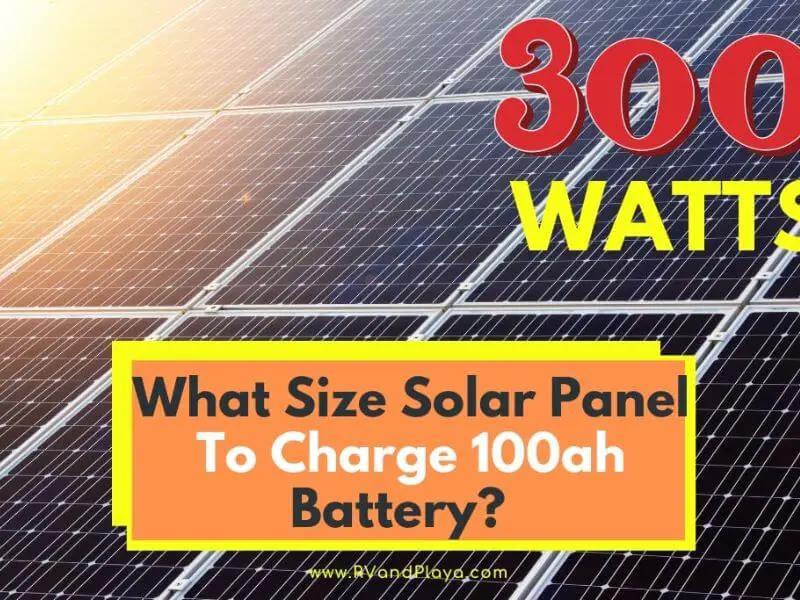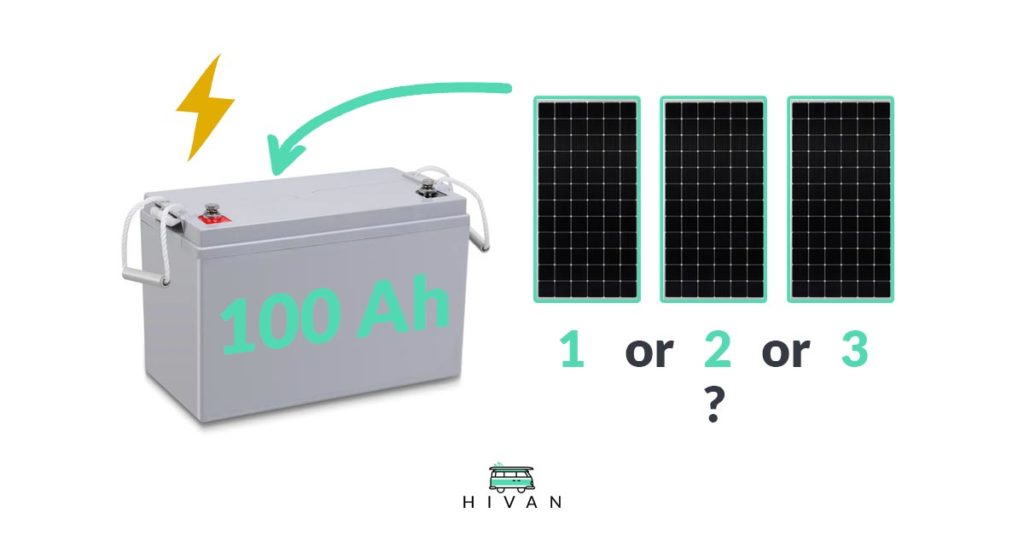Amazing Info About Can A 150w Solar Panel Charge 100Ah Battery
/product/29/543985/1.jpg?1641)
Understanding the Solar Panel & Battery Matchup
1. Getting the Basics Right
So, you're wondering if a 150w solar panel can charge a 100Ah battery? It's a common question for anyone diving into the world of off-grid power, RVing, or even just trying to be a bit more eco-friendly. Let's break it down in a way that makes sense, even if you're not an electrical engineer (because, honestly, who is?).
First off, let's understand what we're dealing with. A 150w solar panel is like a little sun-powered energy factory, churning out watts (power) when the sun is shining. A 100Ah battery, on the other hand, is like a storage tank, ready to hold that energy for later use. Think of it as filling up your car's gas tank — you want to make sure you have enough juice to get where you need to go.
The crucial bit is whether the "filling" (solar panel output) matches the "tank" (battery capacity). It's not just about the numbers; it's about how efficiently we can get that solar energy into the battery. We need to consider factors like sunlight hours, panel efficiency, and the type of charging system we're using.
Essentially, the success of this pairing boils down to whether the solar panel can generate enough energy over a reasonable timeframe to replenish the battery. It's like asking if you can fill a bucket with a leaky faucet — possible, but it might take a while, and you'll want to minimize the leaks (energy losses).

The Math Behind the Sunshine
2. Crunching the Numbers (Without the Headache)
Okay, so we need to do a little math, but don't worry, it's not calculus! We're going to estimate how long it will take a 150w solar panel to charge a 100Ah battery. Key word here is estimate because real-world conditions are rarely perfect.
Let's assume your solar panel produces its rated 150 watts for, say, 5 hours a day (peak sun hours). This is a generous assumption, as weather, panel angle, and shade can all affect the output. Now, 150 watts at 12 volts (a typical battery voltage) equates to about 12.5 amps (150w / 12v = 12.5A). However, we need to consider energy loss due to conversion efficiency, which is around 75%. Therefore, it becomes 9.375 Amps reaching our battery.
Charging a 100Ah battery fully would ideally take around 100Ah / 9.375A = 10.6 hours. This means, assuming you get peak sunlight for those 5 hours, it will take approximately 2 days to fully charge a completely depleted 100Ah battery. Keep in mind, batteries don't like to be fully depleted so you will never really reach zero and that timeframe will get shorter. The real world isn't a lab, though, expect variation. And that calculation is idealized!
So, can a 150w solar panel charge a 100Ah battery? Yes. However, it might be a slow process, especially if you live in an area with limited sunlight or frequently experience cloudy days. Consider this if you require a quick charge or plan to use a significant amount of power regularly. You might need to scale up.

How Many Solar Panels Required To Charge A 100 Ah Battery In 5 Hours
Factors That Affect Charging Efficiency
3. Sun, Shade, and Everything in Between
Charging a battery with solar power isn't as simple as plugging it in and walking away. Several factors can dramatically affect how efficiently your 150w solar panel fills up that 100Ah battery. Understanding these factors can help you optimize your setup and avoid frustration.
First and foremost, sunlight is king. The amount of sunlight your panel receives directly impacts its output. More sun means more power, and less sun means less power. Obvious, right? But it's not just about having a sunny day. The angle of the sun, the time of year, and even atmospheric conditions (like haze or pollution) can all play a role. Aim to position your solar panel at the optimal angle to capture the most direct sunlight throughout the day.
Then there's the panel itself. Not all solar panels are created equal. Some are more efficient than others, meaning they can convert a higher percentage of sunlight into electricity. Also, keep your panel clean! Dust, dirt, and bird droppings can all block sunlight and reduce its output. A quick wipe-down every now and then can make a noticeable difference.
Finally, consider your charging system. A charge controller is a crucial component that regulates the flow of electricity from the solar panel to the battery. Without it, you risk overcharging and damaging your battery. Different types of charge controllers have different efficiencies. An MPPT (Maximum Power Point Tracking) controller is generally more efficient than a PWM (Pulse Width Modulation) controller, especially in suboptimal conditions. Investing in a quality charge controller can significantly improve your charging efficiency and extend the life of your battery.

Which Solar Panel Can Charge A 100Ah Battery? The Power Facts
Is a 150w Panel Enough? Real-World Scenarios
4. Matching Your Needs to Your Solar Power
The burning question: Is a 150w solar panel enough to charge a 100Ah battery for your needs? The answer, as with most things, is it depends. It hinges on how you plan to use the power stored in that battery.
If you're only planning to power a few small devices, like a phone, a tablet, or a small LED light, then a 150w panel might be sufficient. These devices consume relatively little power, and a fully charged 100Ah battery could keep them running for quite a while. Think of it as a weekend camping trip where you just need to keep your devices topped up. This situation would be optimal for the size and power of your system.
However, if you're planning to run larger appliances, like a refrigerator, a microwave, or a power tool, then a 150w panel is likely to be insufficient. These devices consume a significant amount of power, and a 100Ah battery could be drained very quickly. Plus, trying to replenish that power with a relatively small solar panel might prove difficult, especially if you're not getting consistent sunlight. This situation would not benefit your system, and most likely lead to power loss.
Consider your average daily power consumption. Add up the wattage of all the devices you plan to use and estimate how many hours each day you'll be using them. This will give you a rough idea of your daily power needs. Compare that to the amount of power your 150w solar panel can generate on an average day. If your consumption is significantly higher than your generation, you'll need to either reduce your consumption or increase your solar power capacity. You can also consider getting an additional panel. If you need more power, consider investing in a larger solar panel or adding more panels to your array.

Optimizing Your Solar Charging Setup
5. Tips and Tricks for Maximum Efficiency
Okay, so you've decided to go with a 150w solar panel and a 100Ah battery. Now, how do you squeeze every last drop of sunshine out of that setup? Here are a few tips and tricks to maximize your charging efficiency.
First, panel placement is key. As mentioned earlier, angle your solar panel to directly face the sun for as much of the day as possible. In the Northern Hemisphere, this generally means facing south. You can use a solar panel mount to adjust the angle depending on the season. A little tweaking can make a big difference in power generation.
Second, monitor your battery's state of charge. Avoid letting your battery discharge too deeply. Deep discharges can shorten the lifespan of your battery. Most charge controllers have indicators that show the battery's state of charge. Keeping an eye on these indicators will help you manage your power consumption and prevent deep discharges.
Third, consider adding a battery monitor. A battery monitor provides detailed information about your battery's voltage, current, and state of charge. This information can help you optimize your charging and discharging patterns and identify any potential problems early on. Some battery monitors also have built-in alarms that alert you to low voltage or other issues.
Finally, remember that patience is a virtue. Solar charging can be a slow process, especially on cloudy days. Don't expect your battery to be fully charged overnight. Be patient, monitor your setup, and make adjustments as needed. With a little planning and optimization, you can harness the power of the sun to keep your battery charged and your devices running.
